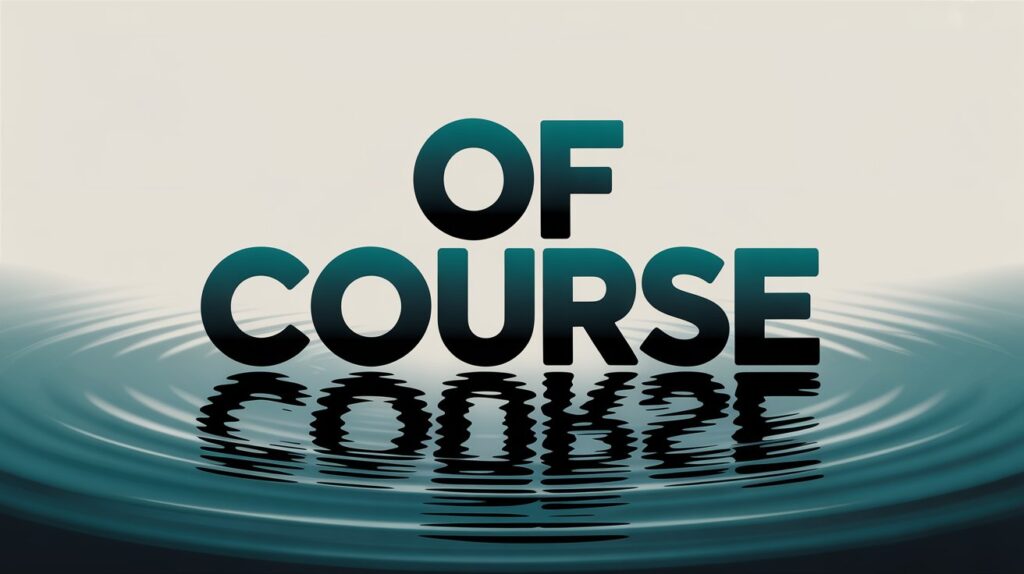When you hear the phrase of course, it rolls off the tongue naturally. But seeing it written out can spark a question: should it be ofcourse or of course as one? This confusion is common, and many people wonder which is the correct spelling and usage. Let’s clear up the confusion and explain everything you need to know about of course vs ofcourse.
Quick Summary
Of course is the correct spelling—two words meaning certainly or naturally. Ofcourse is a common misspelling with no proper meaning. Always use of course in writing to sound clear and professional.
Why Does Confusion About “Ofcourse” vs “Of Course” Exist?

English can be tricky, especially when it comes to phrases that feel like single words when spoken. The phrase “of course” is often miswritten as “ofcourse,” especially in texting, social media, or casual writing. The mistake happens because people hear the phrase as one word and try to match that in writing.
Here are some reasons why this confusion persists:
- Fast typing habits: People tend to drop spaces to type quickly.
- Autocorrect errors: Some devices incorrectly suggest “ofcourse.”
- Lack of grammar awareness: Writers unfamiliar with English grammar rules make mistakes.
- Influence of other compound words: Some two-word phrases eventually become one word (e.g., “alot” is incorrect, but “anyone” is correct).
Despite these reasons, “ofcourse” is not a valid English word. It’s simply a misspelling.
What Do “Of Course” and “Ofcourse” Mean?
“Of Course” — The Correct Phrase
The phrase “of course” is a common English expression used to mean:
- Certainly
- Naturally
- Without a doubt
It adds emphasis or confirms something is obvious or expected.
Example sentences:
- “Of course, I’ll be there on time.”
- “She’s, of course, the best choice for the role.”
The phrase is made of two separate words: “of” (a preposition) and “course” (a noun), forming a prepositional phrase.
“Ofcourse” — The Incorrect Form
“Ofcourse” is not recognized in dictionaries. It’s a misspelling or informal contraction created by blending the two words incorrectly.
Using “ofcourse” can hurt your writing’s clarity and professionalism. Avoid it in any formal or academic context.
Synonyms and Similar Terms to “Of Course”

If you want to vary your language, here are some great synonyms for “of course”:
| Synonym | Usage Example |
|---|---|
| Certainly | “Certainly, I agree with your point.” |
| Absolutely | “Absolutely, you should attend the meeting.” |
| Naturally | “Naturally, she excels at her job.” |
| Sure | “Sure, I can help you with that.” |
| Without a doubt | “Without a doubt, it’s the best option.” |
| Definitely | “Definitely, we need to act fast.” |
These can help avoid repetition and make your writing more engaging.
When and How to Use “Of Course”
You’ll find of course popping up all the time in everyday conversation and writing. It works as an adverbial phrase that means certainly, naturally, or without a doubt. Using it correctly adds clarity and emphasis to your statements.
When to Use “Of Course”
- Agreeing or confirming: When you want to say yes emphatically or confirm something is true.
Example: “Can you help me with this project?” — “Of course!” - Expressing something obvious: To highlight something that should be clear or expected.
Example: “Of course, water boils at 100°C.” - Polite emphasis: Softening a command or request by adding a friendly tone.
Example: “Of course, feel free to ask any questions.”
How to Use “Of Course” in Sentences
Here are some common ways to use of course naturally:
- At the beginning of a sentence:
Of course, I’ll join you for dinner. - Mid-sentence as an interrupter (usually set off by commas):
The movie, of course, was a huge success. - At the end of a sentence for emphasis:
You can borrow my car, of course.
Common Mistakes to Avoid
- Never write ofcourse as one word. It’s a misspelling and looks unprofessional.
- Don’t confuse off course (which means not on the right path) with of course.
Quick Tip Table: Usage and Meaning
| Usage Context | Meaning | Example |
|---|---|---|
| Agreement | Certainly, definitely | Of course, I’ll help you. |
| Obvious fact | Naturally, obviously | The sun, of course, rises east. |
| Polite emphasis | Friendly confirmation | You can leave early, of course. |
By mastering when and how to use of course, you’ll sound confident and polished in your writing and speech.
Examples of ‘Of Course’ in Sentences

Seeing of course used in real sentences helps you understand how to apply it naturally. Here are varied examples showcasing different contexts and tones:
Agreement and Confirmation
- “Can you join us for the meeting?”
“Of course, I wouldn’t miss it.” - “Is the report ready?”
“Of course, it was sent this morning.”
Emphasizing the Obvious
- “Water freezes at 32°F, right?”
“Of course, that’s basic science.” - “You know the company policy?”
“Of course, it’s written in the handbook.”
Polite Emphasis and Encouragement
- “Can I ask you a question?”
“Of course, go ahead.” - “May I use your laptop?”
“Of course, just don’t forget to save your work.”
As an Interruption for Clarity or Emphasis
- “The project, of course, requires approval from management.”
- “She’s, of course, one of the top performers this quarter.”
In Casual Conversation
- “Want to grab coffee?”
“Of course! I could use a break.” - “Did you enjoy the concert?”
“Of course, it was amazing!”
Table: Examples of ‘Of Course’ in Different Sentence Positions
| Position | Example Sentence | Purpose |
|---|---|---|
| Beginning | Of course, I’ll help you with that. | Agreement or confirmation |
| Middle | The results, of course, were impressive. | Emphasis or clarification |
| End | You’re welcome to come, of course. | Polite reassurance or emphasis |
Using of course properly adds warmth and certainty to your conversations and writing. It’s a versatile phrase that makes your communication clear and confident.
Origins of “Of Course”
Understanding where of course comes from gives you a richer grasp of its meaning and use today. This phrase has deep roots in the English language and carries a history tied to logic and natural progression.
Historical Background
The phrase “of course” dates back to the late Middle Ages, around the 15th century. It originally meant “according to the natural order” or “as a matter of course,” suggesting something that happens naturally or logically.
- The word “course” in this phrase comes from the Latin cursus, meaning “a running,” “a course,” or “a path.” Over time, course in English evolved to refer not just to physical paths but also to the “course of events” or “natural order.”
- Combining “of” with “course” formed an idiomatic expression used to describe something expected or inevitable.
Evolution in Usage
- In early English literature, of course often appeared in contexts related to the natural flow or sequence of things. It conveyed a sense of inevitability or something following naturally.
- By the 17th and 18th centuries, the phrase had shifted more towards everyday speech, where it became a common way to express agreement, certainty, or obviousness.
Read More:
- Trailer vs Trailor: Which One Is Correct
- Is It Scrapped or Scraped? Let’s Clarify the Confusion
- Excell or Excel: What is the Correct Spelling?
- hayday or heyday: What’s the Right Word to Use?
Linguistic Insights
- The phrase falls under what linguists call fixed expressions or idioms — phrases whose meanings can’t be deduced from the individual words alone.
- Unlike off course (which means “not on the correct path”), of course always implies correctness or expectedness.
Example from Literature
- Shakespeare used phrases resembling “of course” in his plays, often to highlight natural progression or certainty in events.
Summary Table: Origins of “Of Course”
| Aspect | Details |
|---|---|
| Origin | Late Middle Ages (15th century) |
| Root Word | Latin cursus meaning “running” or “path” |
| Original Meaning | Following the natural order or expected course |
| Modern Meaning | Expressing certainty, agreement, or obviousness |
| Linguistic Category | Fixed idiomatic expression |
Knowing the origins of of course enhances your appreciation of its use. It’s not just a phrase; it’s a nod to centuries of language evolution emphasizing natural flow and certainty.
Common Mistakes to Avoid: “Off Course” vs “Of Course”
People often confuse “of course” with “off course”. The difference is important:
| Phrase | Meaning | Example |
|---|---|---|
| Of course | Certainly, naturally | “Of course, I’ll help you.” |
| Off course | Away from the planned path or direction | “The ship went off course during the storm.” |
Be careful not to mix these two, as their meanings and spellings differ completely.
How to Avoid Confusion Between “Of Course” and “Ofcourse”
To stay clear of this common spelling error, try these tips:
- Remember it’s two words: “of” + “course.”
- Think of it as a phrase, not a single word.
- Use spellcheck tools but don’t rely solely on them.
- Read your writing out loud—does it sound natural?
- When in doubt, check trusted sources like dictionaries or style guides.
Summary Table: Correct Usage of “Of Course”
| Aspect | Correct Usage | Incorrect Usage |
|---|---|---|
| Spelling | of course | ofcourse |
| Meaning | Certainly, naturally | No meaning (misspelling) |
| Formal Writing | Always use “of course” | Avoid “ofcourse” |
| Common Mistake to Avoid | Confusing with “off course” | Confusing with “offcourse” (not a word) |
Conclusion
To wrap up, the correct spelling is always “of course” — two separate words. Writing “ofcourse” is a common mistake but not acceptable in standard English. Knowing the meaning, origins, and proper usage will help you avoid this error and communicate clearly.
Remember, English loves precision! When you write “of course,” you show mastery of the language. If you want to sound natural yet professional, always write it as two words.

Lisa Morris is a seasoned blogger and language enthusiast with a passion for making grammar simple and engaging. At Grammar Scoop, she shares clear, concise tips that help readers master the rules of English with confidence.






